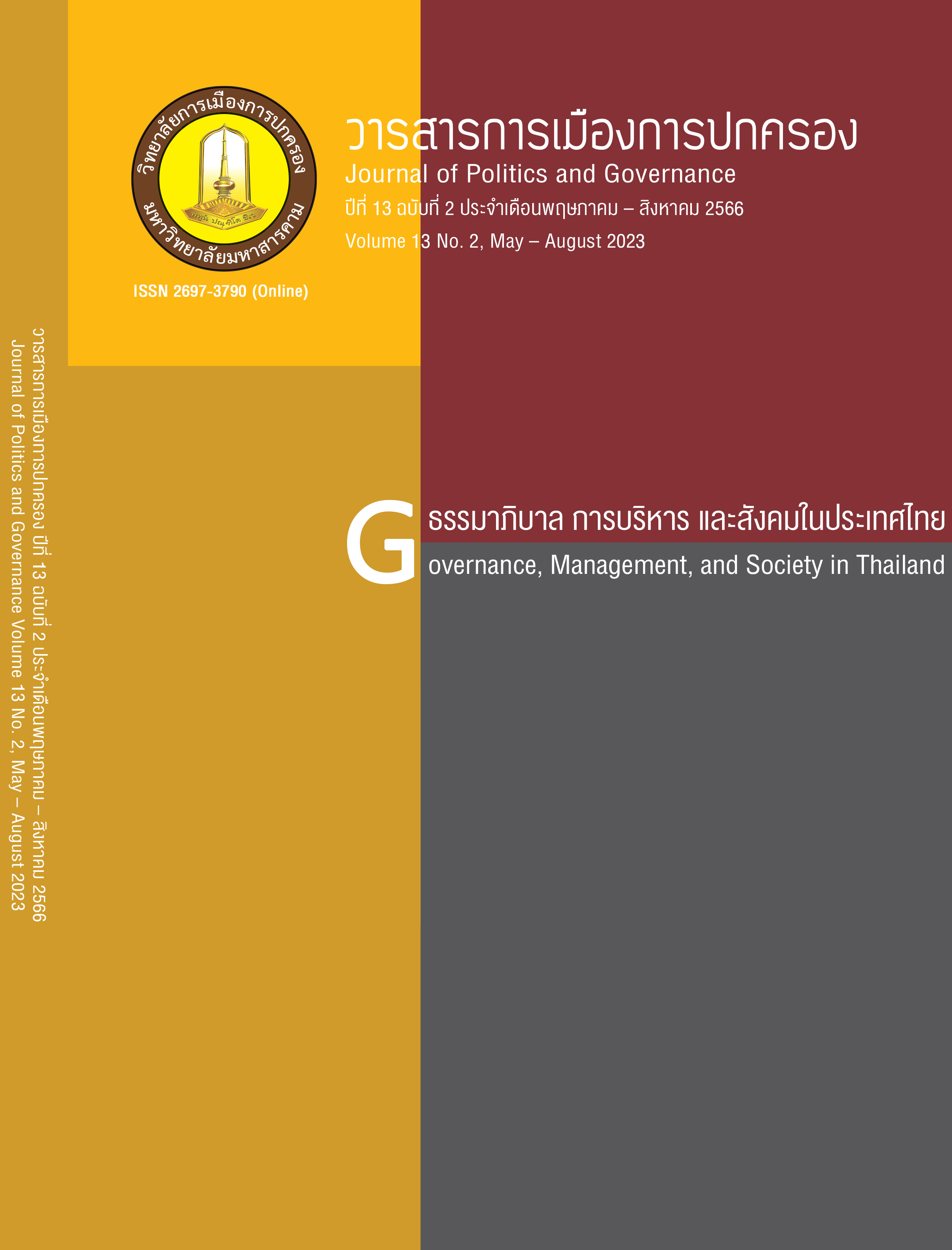Islamic Concept of International Relations in Quran
Main Article Content
Abstract
The objectives of this research article aim to study the Islamic concept of international relations in the Holy Quran and classify the verses related to international relations through the concepts of international relations in the Holy Quran. This is a qualitative research based on the study of documents related to the concept of international relations in Islam both in Thai and foreign languages and in-depth interviews with selected interviewees, academics and specialists including political science, Islamic history, muslim studies, and current issues the total number of four informants are then divided into categories and start to analyze, then summarized into principles and found the connection of the data. Based on the Inductive Analysis from the interviewees. The study revealed that there were only main concepts of international relations in the verses of the Holy Quran with no details. In this research, those verses were classified into main categories such as the concept of encouraging good relations, international cooperation, justice and equality, and negotiations to prevent war. Although there was no explicit term for international relations, the Holy Quran could be a pattern and implement for the concept of international relations.
Article Details
References
กรมการศาสนา กระทรวงวัฒนธรรม. (2554). ความรู้ศาสนาเบื้องต้น. กรุงเทพฯ: โรงพิมพ์ชุมชนสหกรณ์การเกษตรแห่งประเทศไทย.
จรัญ มะลูลีม. (2541). เอเชียตะวันตกศึกษา: ภาพรวมทางสังคมศาสตร์และมนุษยศาสตร์. กรุงเทพฯ: สถาบันเอเชียศึกษา จุฬาลงกรณ์มหาวิทยาลัย.
จรัญ มะลูลีม. (2555ก). อิสลามการเมืองในการเมืองตะวันออกกลาง. กรุงเทพฯ: ศยาม.
จรัญ มะลูลีม. (2555ข). OIC องค์การมุสลิมโลกในโลกมุสลิม. กรุงเทพฯ: ศยาม.
จุฑาทิพ คล้ายทับทิม. (2551). หลักความสัมพันธ์ระหว่างประเทศ. กรุงเทพฯ: สำนักพิมพ์แห่งมหาวิทยาลัยเกษตรศาสตร์.
เดโช สวนานนท์. (2545). พจนานุกรมศัพท์การเมือง. กรุงเทพฯ: หน้าต่างสู่โลกกว้าง.
บูฆอรี ยีหมะ. (2559). ความรู้เบื้องต้นทางรัฐศาสตร์ (พิมพ์ครั้งที่ 4). กรุงเทพฯ: สำนักพิมพ์แห่งจุฬาลงกรณ์มหาวิทยาลัย.
บูธ, เคน. (2559). ความสัมพันธ์ระหว่างประเทศ: รวมเรื่องที่ต้องรู้ [International Relations: All That Matters] (จันจิรา สมบัติพูนศิริ, ผู้แปล). กรุงเทพฯ: สยามปริทัศน์.
มยุรา วงษ์สันต์. (2546). รู้จักอิสลาม. กรุงเทพฯ: สภายุวมุสลิมโลก สำนักงานประเทศไทย.
เมาดูดี, เมาลานา ซัยยิด อบุล อะลา. (2558ก). ตัฟฮีมุลกุรอาน ความหมายอัลกุรอาน, เล่ม 1. [Tafheem-ul-Quran, vol I] (บรรจง บินกาซัน, ผู้แปล). กรุงเทพฯ: ศูนย์หนังสืออิสลาม.
เมาดูดี, เมาลานา ซัยยิด อบุล อะลา. (2558ข). ตัฟฮีมุลกุรอาน ความหมายอัลกุรอาน, เล่ม 2. [Tafheem-ul-Quran, vol II] (บรรจง บินกาซัน, ผู้แปล). กรุงเทพฯ: ศูนย์หนังสืออิสลาม.
เมาดูดี, เมาลานา ซัยยิด อบุล อะลา. (2553). ตัฟฮีมุลกุรอาน ความหมายอัลกุรอาน, เล่ม 3. [Tafheem-ul-Quran, vol III] (พิมพ์ครั้งที่ 2) (บรรจง บินกาซัน, ผู้แปล). กรุงเทพฯ: ศูนย์หนังสืออิสลาม.
เมาดูดี, เมาลานา ซัยยิด อบุล อะลา. (2555ก). ตัฟฮีมุลกุรอาน ความหมายอัลกุรอาน, เล่ม 4. [Tafheem-ul-Quran, vol IV] (บรรจง บินกาซัน, ผู้แปล). กรุงเทพฯ: ศูนย์หนังสืออิสลาม.
เมาดูดี, เมาลานา ซัยยิด อบุล อะลา. (2555ข). ตัฟฮีมุลกุรอาน ความหมายอัลกุรอาน, เล่ม 5. [Tafheem-ul-Quran, vol V] (บรรจง บินกาซัน, ผู้แปล). กรุงเทพฯ: ศูนย์หนังสืออิสลาม.
เมาดูดี, เมาลานา ซัยยิด อบุล อะลา. (2555ค). ตัฟฮีมุลกุรอาน ความหมายอัลกุรอาน, เล่ม 7. [Tafheem-ul-Quran, vol VII] (บรรจง บินกาซัน, ผู้แปล). กรุงเทพฯ: ศูนย์หนังสืออิสลาม.
ศราวุฒิ อารีย์. (2550). การก่อการร้าย: มุมมองของโลกอิสลาม. กรุงเทพฯ: สถาบันเอเชียศึกษา จุฬาลงกรณ์มหาวิทยาลัย.
สามารถ ทองเฝือ. (2562). อิสลามกับการเมือง. ปัตตานี: ปาตานีฟอรั่ม.
สัญญา ชีวะประเสริฐ. (2564). อารยธรรมอิสลามกับความขัดแย้งในตะวันออกกลางในทรรศนะของแซมมวล ฮันทิงตันและเอ็ดเวิร์ด ซาอิด. วารสารประวัติศาสตร์, 45, 175-188.
หะซัน อัลบันนา. (2547). อิสลามวิถีแห่งสันติ [Peace in Islam] (ซุฟอัม อุษมาน, ผู้แปล). กรุงเทพฯ:
อิสลามิคอะเคเดมี.
อณัส อมาตยกุล. (2561). พินิจคำสอน ประวัติศาสตร์และอารยธรรมอิสลาม. กรุงเทพฯ: นัทชาพริ้นติ้ง.
อณัส อมาตยกุล. (2564, 28 พฤษภาคม). อดีตอาจารย์คณะสังคมศาสตร์และมนุษยศาสตร์ มหาวิทยาลัยมหิดล[บทสัมภาษณ์].
อานิส พัฒนปรีชาวงศ์. (2564, 20 มีนาคม). ผู้อำนวยการสถาบันอิสลามและภาษาอาหรับ [บทสัมภาษณ์].
อิสมาอีลลุตฟี จะปะกียา. (2547). อิสลามศาสนาแห่งสันติภาพ [Islam: The religion of peace] (ซุฟอัม อุษมาน, ผู้แปล). ปัตตานี: มัจลิสอิลมีย์ปัตตานี.
อิสมาอีลลุตฟี จะปะกียา. (2564, 30 มีนาคม). อธิการบดีมหาวิทยาลัยฟาฏอนี [บทสัมภาษณ์].
อุดม บัวศรี. (2541). ศาสนา: พัฒนาการแห่งประวัติศาสตร์มนุษย์. วารสารมนุษย์ศาสตร์สังคมศาสตร์, 16(1), 51-69.
Abo-kazleh, M. (2006). Rethinking international relations theory in Islam: Toward a more adequate approach. Alternatives: Turkish Journal of International Relations, 5(4), 41-56.
Abusulaiman, A. (1993). Toward an Islamic theory of international relations: New directions for methodology and thought. Virginia: International Graphics.
Agarwal, C. (1997). Political theory: Principles of political science (8th ed). New Delhi: S. Chand & Company Ltd.
Hamid, A. (2011). Public international law: A practical approach (3rd ed). Kuala Lumpur: Sweet and Maxwell Asia.
Istanbuli, Y. (2001). Diplomacy and diplomatic practice in the early Islamic era. Oxford: Oxford University Press.
Khadduri, M. (1966). The Islamic law of nations: Shaybani's Siyar. Maryland: The Johns Hopkins Press.
Mohseni, P. (2013). The Islamic awakening: Iran’s grand narrative of the Arab uprisings, Middle East brief 71. Retrieved from https://www.brandeis.edu/crown/publications/middle-east-briefs/pdfs/1-100/meb71.pdf
Wang, Y. (2009). Diplomacy: Theory and practice in Islam. Kuala Lumpur: IIUM Press.


